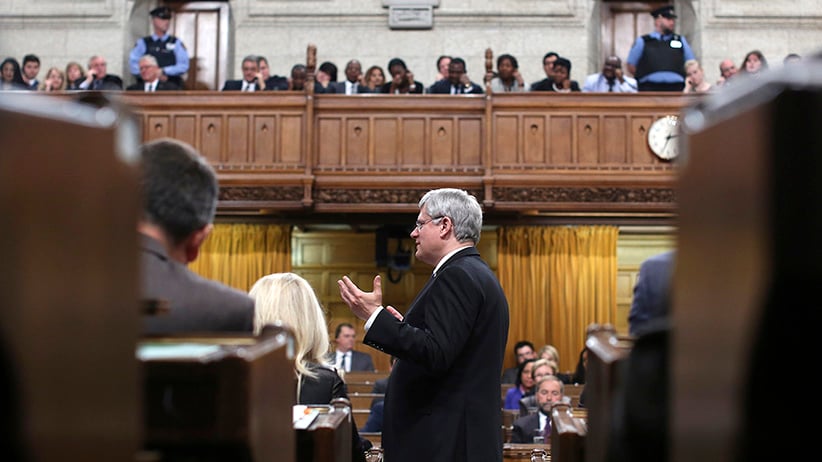Whatever happened to real debate in the House of Commons?
The sad truth about the stultifying nature of Canadian parliamentary debate
Share

On Nov. 18 in Ottawa, Maclean’s will hand out the Parliamentarian of the Year Awards. Before we do, we’d like to have a frank talk about the work and worth of an MP. This week, in our Inside Ottawa series: the debate about debate.
There’s a paradox in the debate over parliamentary debate in Canada. Critics routinely deride the state of debate as largely useless and justifiably ignored, yet insist there should be more of it. When Canadians imagine the House of Commons in action, they usually picture question period. While that daily dose of partisan sparring isn’t always edifying, at least it’s lively and the Commons is full. Routine debate on legislation—in theory, the core job of an MP—typically features monotone discourse echoing in a near-empty chamber.
Even on the first day of this fall’s sitting, the scheduled debate conveyed no hint of back-to-school buzz. The bill slated for scrutiny, the Energy Safety and Security Act, was actually important. It updates rules governing offshore spills and nuclear accidents, increasing the liability of companies. But the evening debate on Bill C-22 featured a half-dozen government MPs, mainly preoccupied with their smartphones and laptops, across from only a few more opposition members, none able to stir any sense of urgency.
But if House debate is often enervating, many MPs still regard it as worthy of getting worked up about. Earlier on their first day back, just after QP, they were treated to a sharp exchange on the subject. Elizabeth May, the Green party leader, raised what’s called a point of privilege, protesting the Conservatives’ routine practice of imposing “guillotine measures” to strictly limit the time allowed to debate bills. Conservative House leader Peter Van Loan does not deny this government resorts to “time allocation,” which previous governments used more sparingly, as a standard management tool. “There’s no doubt we have used it as a scheduling device, not as a limiting-of-debate device,” Van Loan told Maclean’s last spring. “So, yeah, we’ve tried to change the culture around it, the whole meaning of it and what it does.”
In firing back at May, though, Van Loan came armed with figures to refute her claim that the Harper government’s habitual use of time allocation has strangled debate. Critics of the Canadian Parliament often look wistfully to the supposedly superior British model. So Van Loan rhymed off some Canada-U.K. comparative statistics. New legislation can typically be debated at three stages under the Westminster system. At all three opportunities, he said, there’s been more debate, since the 2011 federal election, in Ottawa than in London. For instance, at the key “report stage”—when a bill returns to the House after a committee of MPs has studied it—debate in Canada, on average, lasts about a day and a half, Van Loan said, compared to less than a day in Britain. “The opposition says that we are shortening debate,” he said. “No, we are actually a real talk shop, compared with what they do across the ocean.”
Of course, quantity and quality aren’t the same thing. In his new book, Independent MP Brent Rathgeber, who bolted from the Tory caucus last year, describes government MPs being handed “speaking notes or complete canned speeches” that they are forced to rely on—rather than their own wit or insight—during debate. “The entire process is a farce,” Rathgeber says, calling it “bad theatre.” Similarly, May likens that stiff reading of lines to “high school drama,” but credits a few Conservatives with daring to venture off-script “every now and then,” including Employment Minister Jason Kenney and Industry Minister James Moore. Tory MP Michael Chong, champion of a much-discussed private member’s bill that seeks to curb the power of party leaders over ordinary MPs, has bemoaned the fact that MPs have “no input into the content” of their debate speeches, and called for an existing House rule against reading from prepared texts, now rarely invoked by the Speaker, to be enforced.
It’s not clear, however, that returning to more open-ended debate, or even prodding MPs to look up from their prepared notes now and then, would make the exercise much more meaningful. Time and texts, after all, ultimately matter less than how MPs finally vote. As long as rigid party discipline dictates nearly every outcome, restoring a sense of real purpose to debate may be impossible.